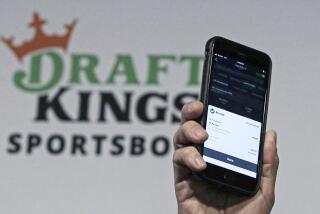SportsClub Sues Suppliers, Rivals in Pricing Battle : Discounter Says Manufacturers Won’t Provide Goods at Urging of Competitor Retail Chains
‘Tis the season to be buying. And, by the same token, selling.
This Christmas season finds Los Angeles entrepreneur Robert J. McNulty in a spate of court battles here as he pursues unorthodox methods of supplying top national brand athletic shoes, water skis and other sports equipment for his new retail chain of sports stores called All American SportsClub.
McNulty contends that a number of manufacturers, who he claims are influenced by some of his retail competitors, have reneged on contracts and turned down millions of dollars of orders from SportsClub in recent months because his stores heavily discount the name brand merchandise on an everyday basis.
The entrepreneur has insisted on providing name brands in his stores, as opposed to private brands often favored by discount stores. This determination and the reaction to it have led to a legal showdown with major effects on sports retailing in Southern California.
Lawsuits erupted this fall when, spurned by a number of manufacturers, McNulty obtained their brands outside regular channels through brokers and so-called diverters.
Battles With Reebok
Reebok, the uncrowned king of U.S. athletic shoe manufacturing, is among McNulty’s weighty adversaries in the ensuing legal fighting.
The Massachusetts manufacturer asked a judge last month to stop All American SportsClub, which is not an “authorized” Reebok dealer, from selling what the suit termed “bootlegged” Reebok products. But the shoe company lost the first round in Los Angeles County Superior Court.
Meanwhile, McNulty has gone on the offensive with an antitrust suit against two other shoe manufacturers, the makers of New Balance and Saucony shoes, as well as national makers of firearms, golf carts, racquetball equipment, warm-up suits and other sporting goods.
But his suit did not stop there. It named as defendants several major California retailers--including Big 5 and Sportmart. Alleging a conspiracy to fix retail prices, the suit accuses the retailers of threatening to quit buying from any suppliers that sell to SportsClub.
The retailer and manufacturers named as defendants have not filed answers to the complaint. New Balance said it denied the allegations and would answer them soon in court but had no other comment. Other defendants said they did not want to discuss the pending case, while some did not respond to telephone requests for comment.
At the center of the storm is McNulty, a 40-year-old entrepreneur who built the successful Home Club home improvement store chain. His technique was to discount prices heavily, selling merchandise in warehouse settings so frill-free as to be Spartan.
Thirty months after starting the first two outlets in 1983 with $4 million in venture capital, McNulty took Home Club public late last year and shortly afterward sold it for $151 million to Zayre Corp.
It was the Fullerton-based Home Club that was the pattern for Long Beach-based All American SportsClub, which in October and November opened its first four stores in Burbank, Torrance, Riverside and Sacramento. McNulty says he plans to open 10 or 12 more of the stores next year.
He has taken on board as vice chairman Don Klosterman, who was president and general manager of the Los Angeles Express of the United States Football League and before that a top officer of the Los Angeles Rams of the National Football League.
Klosterman is involved in company relations with sports teams and planning charity activities, while McNulty is the hands-on manager in the stores.
McNulty, who prefers to say his stores have “value-oriented” prices rather than discounts, says efficiency and dedicated, high-energy employees make it work. One way he controls overhead is by not having a distribution center, noting that “the stores are large enough to take direct shipments.”
Filed Antitrust Suit
When his troops encountered pervasive resistance by suppliers of name brand merchandise, McNulty’s firm (whose corporate name is SportsClub Inc.) launched his multimillion-dollar antitrust action. It accuses defendants of violating the Clayton Act by conducting a concerted effort to restrain trade.
Manufacturers named as defendants are New Balance, Alston, Mass.; Hyde Athletic Industries, Peabody, Mass., which makes Saucony shoes; Browning, Morgan, Utah, manufacturer of firearms and golf equipment, and Ektelon of San Diego, which makes racquetball equipment and apparel. Retailers named defendants are United Merchandising, doing business as Big 5, Sportmart and Chick’s.
In addition to Clayton Act violations, the manufacturers also are accused of breach of contract. The manufacturers and retailers named as defendants declined to comment on the lawsuit.
In addition to Reebok, SportsClub is being sued by another manufacturer, Connelly Skis, for selling its merchandise against its wishes. A federal judge here recently took under submission Connelly’s request for an injunction against SportsClub and the firm from which it bought Connelly skis, American Sales Corp.
And in still another action, SportsClub is suing Warnaco, Bridgeport, Conn., alleging breach of contract by failing to supply sports apparel of various brands to SportsClub.
Buys From Brokers
The key to his ability to continue sell some brands, despite the obstacles, has been his success in getting the forbidden brands through brokers, some of whom have diverted shipments headed overseas, according to court testimony.
In suing SportsClub, Reebok and Connelly have given various reasons for refusing to fill orders from the SportsClub stores. Basically they contend that it has no right to sell their goods because it isn’t one of their authorized dealers. They claim SportsClub has violated federal trademark and unfair competition law, which the chain has contested.
Reebok’s suit also contends that SportsClub’s warehouse-type stores are not seemly places for its stylish merchandise. In its papers, Reebok said it fears that SportsClub is a threat to its system of distributing only through their authorized dealers.
In its lawsuit filed Nov. 7 in Los Angeles County Superior Court, the shoe maker described SportsClub as “a high-volume, low-overhead sports retailer which provides negligible customer service in warehouse-like surroundings and is unqualified to be an authorized Reebok dealer,” adding:
“Reebok selects only those dealers who provide quality services in a quality atmosphere appropriate for Reebok’s high-end footwear products.”
In a declaration that is part of the court record, Reebok’s Western regional sales manager, Daniel McCormack, said that when he visited the newly opened SportsClub store in Sacramento on Oct. 14 he found an uncarpeted, warehouse-like structure with shoes displayed in their original shipping cartons.
‘Dismal Atmosphere’
The concrete slab floor, “when combined with the open rafters and general darkness of the facility, projected a rather dismal atmosphere,” McCormack added.
Reebok told the court that when it declined to make SportsClub a dealer, the retailer threatened to “screw up” Reebok’s dealership system by obtaining and selling Reebok products without authorization.
On its part, SportsClub told the court in its opposition papers that it was selling genuine goods legally bought and paid for.
In a declaration, a SportsClub senior vice president, Raymond Niedzwiecki, told the court that SportsClub seeks to sell “all merchandise at the lowest available retail price in the area in which the store is located.” Nevertheless, it also offers “a very high level of service,” including expert consultants to assist customers in buying merchandise best suited for their needs, he said.
“As Reebok has been one of the best-selling items in the sporting goods market over the last several years,” he continued, “I determined that it was important that SportsClub carry Reebok, in that Reebok would be conspicuous by its absence.”
The judge refused to issue the temporary restraining order sought by Reebok and set an evidentiary hearing for Dec. 4 on Reebok’s request for a preliminary injunction. However, Reebok had the proceedings removed from the court’s active calendar at that point.
“The suit is still proceeding,” Reebok lawyer Jack Douglas said recently, in response to an inquiry.
Claims Conspiracy
Meanwhile, SportsClub’s antitrust suit, which does not name Reebok among the defendants, alleges that the defendants conspired to fix the retail price of sporting goods by refusing to deal with SportsClub and other discounters.
“The retailer defendants, along with other non-defendant co-conspirator retailers . . . fear that the opening of plaintiff’s stores will substantially reduce their share of the market,” the suit said.
As part of the alleged conspiracy, the suit states, these retailers have threatened the supplier defendants and other suppliers that they would no longer carry the merchandise of any supplier who sold to SportsClub.
In a variation on this, however, the retailers in some cases told suppliers they would continue to carry their merchandise but would sell it at lower prices than SportsClub was selling it, the suit said. In these cases, it went on, the retailers demanded reduced prices or rebates from the suppliers, which had the effect of pressuring them not to deal with SportsClub.
The retailer defendants and other non-defendant co-conspirators “have in fact ceased to carry the merchandise of suppliers who have continued to deal with the plaintiff.”
The suit alleges that manufacturer defendants contracted to sell goods to SportsClub and then refused to do so. Among other things, the suit asks the court to force the manufacturers to perform on those alleged contracts.
McNulty says he would rather spend all his energies on retailing than in the unfamiliar arena of the courts. He says he believes that it would be better to settle things in the marketplace, adding a rhetorical question:
“Since when in America don’t we thrive on competition?”
More to Read
Inside the business of entertainment
The Wide Shot brings you news, analysis and insights on everything from streaming wars to production — and what it all means for the future.
You may occasionally receive promotional content from the Los Angeles Times.










